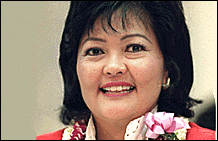


View Point
Friday, November 5, 1999

AS a former elementary school teacher and high school vice principal, I have consistently supported youth programs at the state, city and neighborhood level. They're good for our community and good for Hawaii's future. City user fees should be
fair and equitableWhat I have been hearing is that city facilities need better maintenance and any fees assessed should go directly to maintain the parks.
That is why the City Council established a Golf Fund, which will receive all revenues from golf courses, including concessions and rental of equipment, to maintain the courses.
The $2 across-the-board increase in golf fees will be considered for final approval by the City Council at its chambers on Wednesday, and the public is encouraged to attend the session and share their thoughts.
If the bill passes, local golfers will pay $16 for an 18-hole round of golf on weekends and holidays and $12 on weekdays; resident seniors, juniors and disabled will pay $7 on weekdays.
Monthly passes for resident seniors and disabled will increase from $3 a round to $3.20 a round ($32 for 10 rounds), and resident juniors will pay an increase of 20 cents for a total of $1.20 per round ($12 for 10 rounds).
Rental of carts will be $16, hand carts $4, golf clubs $12 and lockers $7 a month. Junior golf tournament fees will be $3 and adult golf tournament fees $7 for regular tournaments and $12 for shotgun starts.
Beginning Jan. 1, Golf ID cards will be required for eligibility for the lower fee. The cards are free seven days-a-week at Ala Wai and Pali golf courses. Proof of local residence and age is required. The fee for a golfer with no Golf ID Card will be $42.
The purpose of imposing the responsibility on the golfer to provide the ID card is to eliminate any discretionary actions by city employees and to prevent any city liability for injuries sustained on the course by children.
The city receives $10 million annually in total revenues from Oahu's six golf courses. It spends $9 million to operate and maintain the courses and $8 million for debt service.
That includes the construction of the clubhouses, cart path, drainage and other major improvements. The city will receive an additional $1.5 million with the proposed $2 increase, while approximately $6 million will be paid with revenues from real property taxes.
Consequently, golfers and nongolfing taxpayers are asking the city to establish a fair and equitable system of assessing fees for use of city facilities and services and to take into consideration that nonprofit organizations are exempt from paying property taxes.
For example, craft fairs, golf tournaments and "The Taste of Honolulu" pay a fee to the city. Some organizations pay $10 an hour for use of the recreation centers, while gun enthusiasts do not pay any fees at the Koko Head Rifle Range. Camping and picnic permits are also free.
Tennis and swimming organizations are willing to pay a small fee if the funds are directed to the maintenance of the respective facilities or if they could conduct private lessons for a fee on city property. This is an ideal public-private partnership.
Many sports leagues reserve the fields, sell food, beverages, crafts and souvenirs at concessions, collect tournament fees and provide a valuable activity that benefits the entire community.
In turn, they maintain the parks, which is a big help to the city.
IT seems to be a complex situation and, while my colleagues may disagree, I feel that it is our responsibility to discuss the issue and to work with the community to arrive at a reasonable policy on "who should pay?"
Support for free youth and senior citizen activities, in-kind services in lieu of fees, more public-private partnerships, allowing private functions at certain sites for a fee and dedicating revenues for maintenance of city facilities are a few suggestions that I have received. I hope we receive more.
The City and County of Honolulu's budget priorities will always put health and safety first and provide basic services that includes public parks, while we continue to streamline and cut the fat from government. However, the cost of maintaining existing levels of services increases every year.
Real property taxes, the state transient accommodations tax, federal grants, and user fees are the city's sources of revenues, which ultimately determine the city's capabilities.
Rene Mansho is chairwoman of the City Council's
Budget and Economic Development Committee.